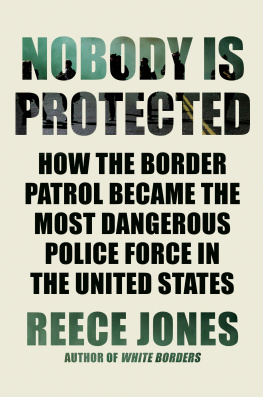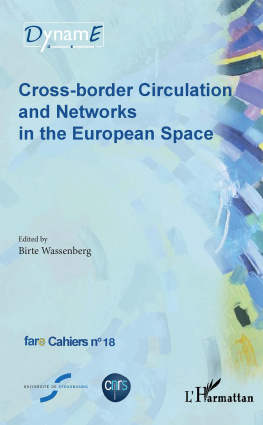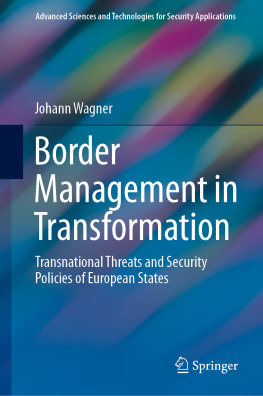
Cross-Border Police Collaboration
This book focuses on a border police collaboration project in the Baltic Sea area aiming at fighting cross-border crimes. It deals with the challenges that inherently suspicious organizations face when forced to work together. The study offers unique insights into a European border police project, giving the reader a behind the scenes account of cross-border policing and how organized crime in Europe is prevented and solved.
Through detailed ethnographic descriptions, the book describes how a trust-based relationship, which is necessary for the exchange of sensitive intelligence information, gradually developed by the participants in and through their joint efforts to protect Europe from external threats and by performing everyday work together.
The study presented in this book is of interest to scholars as well as practitioners concerned with migration management, border policing, intelligence analysis, police culture, and the changing nature of policing in an increasingly global and interconnected world. The book includes various sociological features, such as emotion management, emotional labor, hegemonic masculinity, and takes an interactionist perspective on informal interactions such as joking, bantering, and telling stories. It is also of interest to readers engaged in various forms of intra-, inter-organizational, and inter-cultural collaborations.
Sophia Yakhlef is a lecturer and researcher in sociology and criminology. She received her PhD in sociology in 2018. Her research interest include collaboration, border policing, migration, gender, identity, masculinity, humor, organization culture, the sociology of meetings, and emotion management.
Routledge Innovations in Policing
This series explores innovations in the field of policing and offers the latest insight into the field through research, theoretical applications, case studies, and evaluations. Famous innovations developed over the course of the late twentieth century and into the turn of the twenty-first include approaches such as community policing, broken windows policing, problem-oriented policing, pulling levers policing, third-party policing, hot spots policing, CompStat, and evidence-based policing. Some of these approaches have been successful, and some have not, while new innovations continue to arise. Improving police performance through innovation is often not straightforward. Police departments are highly resistant to change, but through such research we expect to find further refinement of our knowledge of what works in policing, under what circumstances particular strategies may work, and why these strategies are effective in improving police performance.
United Nations International Police Officers in Peacekeeping Missions
A Phenomenological Exploration of Complex Acculturation
Michael R. Sanchez
Ends and Means in Policing
John Kleinig
Stress Inside Police Departments
How the Organization Creates Stress and Performance Problems in Police Officers
Jon M. Shane
Organizational Change in an Urban Police Department
Innovating to Reform
Brenda J. Bond-Fortier
The Case for Youth Police Initiative
Interdependent Fates & the Power of Peace
Nina Rose Fischer
For more information about this series, please visit: https://www.routledge.com/Routledge-Innovations-in-Policing/book-series/RIP
Cross-Border Police Collaboration
Building Communities of Practice in the Baltic Sea Area
Sophia Yakhlef
First published 2021
by Routledge
52 Vanderbilt Avenue, New York, NY 10017
and by Routledge
2 Park Square, Milton Park, Abingdon, Oxon OX14 4RN
Routledge is an imprint of the Taylor & Francis Group, an informa business
2021 Sophia Yakhlef
The right of Sophia Yakhlef to be identified as author of this work has been asserted by her in accordance with sections 77 and 78 of the Copyright, Designs and Patents Act 1988.
All rights reserved. No part of this book may be reprinted or reproduced or utilised in any form or by any electronic, mechanical, or other means, now known or hereafter invented, including photocopying and recording, or in any information storage or retrieval system, without permission in writing from the publishers.
Trademark notice: Product or corporate names may be trademarks or registered trademarks, and are used only for identification and explanation without intent to infringe.
Library of Congress Cataloging-in-Publication Data
Names: Yakhlef, Sophia, author.
Title: Cross-border police collaboration : building communities of practice in the Baltic Sea area / Sophia Yakhlef.
Description: New York, NY : Routledge, 2021. |
Series: Routledge innovations in policing |
Includes bibliographical references and index.
Identifiers: LCCN 2020026539 (print) | LCCN 2020026540 (ebook) |
ISBN 9780367536619 (hardback) | ISBN 9781003082972 (ebook)
Subjects: LCSH: PoliceBaltic Sea RegionInternational cooperation. |
Law enforcementBaltic Sea RegionInternational cooperation. |
Border securityBaltic Sea Region. | Transnational crimeBaltic Sea Region.
Classification: LCC HV8227.75.A2 Y35 2021 (print) |
LCC HV8227.75.A2 (ebook) | DDC 363.209479dc23
LC record available at https://lccn.loc.gov/2020026539
LC ebook record available at https://lccn.loc.gov/2020026540
ISBN: 978-0-367-53661-9 (hbk)
ISBN: 978-1-003-08297-2 (ebk)
Typeset in Bembo
by Newgen Publishing UK
To H, volim te puno.
Contents
Completing this study would not have been possible without the help of a number of talented and encouraging people. I would first like to express my deepest gratitude to Malin kerstrm and David Wsterfors who supervised my thesis. I would also like to thank my co-field researcher Goran Basic for excellent collaboration!
I would like to thank Agneta Malln, Veronika Burcar, Christopher Swader, and Renita Thedvall who read early drafts and helped steer this study into its current shape.
Furthermore, a huge thank you to my family (my mother Susanne, my father Ali, and my brother Jonas) and friends for everything!
As the areas of terrorism, irregular migration, and cross border crime have been amplified in recent years, law enforcement organizations world-wide face various organizational and structural changes. In the past few decades we have seen an increase in international policing and police collaboration that surpasses police jurisdictions and international borders, in Europe and elsewhere. Furthermore, European nation states have faced a large increase in migrants and refugees since 2015: an event that entailed various political responses. Territorial borders were closed and the events triggered debates regarding risks related to public safety and crime resulting from the lack of uncontrolled immigration (Gundhus and Jansen 2020). These changes have amplified the demands of extensive collaboration across national borders and challenged law enforcement organizations to coordinate joint activities and share secret and sensitive information (Brouwer 2020).









